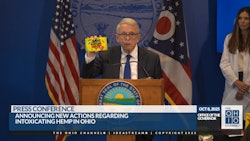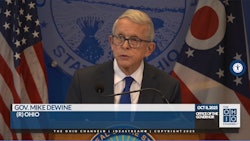
Ohio shops selling intoxicating products containing hemp derivatives have another two weeks to conduct business as usual after a judge issued a temporary restraining order (TRO) on Oct. 14, blocking Gov. Mike DeWine’s executive order.
The executive order, which aims to force Ohio retailers – such as vape shops and gas stations – to stop selling intoxicating hemp products for at least 90 days, was set to go into effect on Oct. 14 as part of the governor’s plan for the Ohio Department of Agriculture (ODA) to adopt emergency regulations to prevent youth access and install consumer safeguards.
Not so fast.
Franklin County Court of Common Pleas Judge Carl A. Aveni granted the TRO and set a preliminary injunction hearing for 9 a.m. on Oct. 28, when the court will further consider the merits of the plaintiffs’ arguments against the governor and ODA.
“The court finds plaintiffs have shown a likelihood of success on the merits,” Aveni wrote in the TRO. “[The executive order] attempts to exercise legislative power reserved by the Ohio Constitution to the General Assembly, thereby violating the separation of powers. In addition, the executive order facially attempts to supersede the statutory framework already enacted by the General Assembly, which specifically defines and permits the sale and regulation of hemp and hemp products.”
The three plaintiffs include Cleveland-based retailer and manufacturer Titan Logistics Group; West Chester-based retailer Fumee Smoke & Vape; and Cincinnati-based manufacturer Invicta Nutraceuticals.
Titan Logistics founder and owner Wesley Bryant contested in the lawsuit that hemp products account for nearly 100% of his company’s sales, and that approximately $150,000 of the company’s inventory will degrade and be “rendered unusable” if it’s not sold in the next 30 days.
In his order, Aveni found that without injunctive relief, the plaintiffs will face immediate and irreparable harm.
The judge also found that potential harm to third parties, such as accidental youth exposure resulting in emergency room visits, is outweighed by the court’s “countervailing interest in preserving our constitutional system of government,” and that public interest favors upholding the Legislature’s constitutional authority over the governor’s unilateral executive action.
“The separation of powers is not a matter of convenience; it is a constitutional safeguard embedded in the Ohio Constitution,” Aveni wrote. “The court’s role is limited to enforcing that safeguard, not to deciding matters of policy. Consistent with that principle, the court urges the General Assembly to exercise its own separate constitutional authority to determine the appropriate scope of comprehensive hemp regulation through the legislative process, and to do so without delay.”
DeWine, who earlier in the day on Oct. 14 shared an article about middle school students in the Cincinnati area being hospitalized after consuming THC edibles, said that when Ohio voters passed Issue 2 to legalize adult-use cannabis in the 2023 election, they voiced their support for a highly regulated marketplace for intoxicating cannabinoid products.
“While we continue to fight in court, today’s developments underscore our continued desire to work with the General Assembly to pass permanent legislation regarding intoxicating hemp,” the governor wrote on X.
While several bills to address hemp regulations are currently in play in the Ohio Legislature, DeWine told reporters on Oct. 8 that he was no longer going to sit on the sidelines after lawmakers failed to send him a bill last year and have yet to do so this session.
During that press conference, DeWine showcased intoxicating hemp products packaged to resemble popular candies and snacks for children.
“This crisis is continuing to get worse and worse, and I’m not going to sit by and let this continue,” he said. “Intoxicating hemp has no required regulatory testing at all and is sold in packages enticing to children, many times mimicking the packaging of common candies. … Intoxicating hemp is dangerous, and we need better to protect our children.”
In announcing his executive order, DeWine also declared a state of emergency, claiming that intoxicating hemp products have been adulterated because, by definition, hemp is a nonintoxicating plant defined by a potency of 0.3% delta-9 THC or less. Therefore, intoxicating hemp products present a threat to public health and safety, the governor said.
With DeWine directing the ODA to adopt emergency regulations, in part to redefine hemp, the department issued draft rules that stipulate the term “intoxicating hemp” as a product that contains more than 0.5 milligrams of THC per serving or more than 2 milligrams of THC per package.
The plaintiffs in the case argued that the governor’s basis for invoking the emergency rulemaking authority collides with the Ohio Revised Code, which states that adding hemp or a hemp product to any other product “does not adulterate” that other product.
The U.S. Hemp Roundtable (USHR), a national industry advocacy group, issued a release on Oct. 14 expressing support for Aveni’s TRO.
“We’re very pleased with the judge’s decision today, and we look forward to working with the Ohio Legislature as a united hemp industry to develop a strong and robust regulatory structure that will keep adult products out of the hands of children while protecting farmers, small businesses and adult consumers who rely on hemp for their health and wellness,” USHR General Counsel Jonathan Miller said.



























